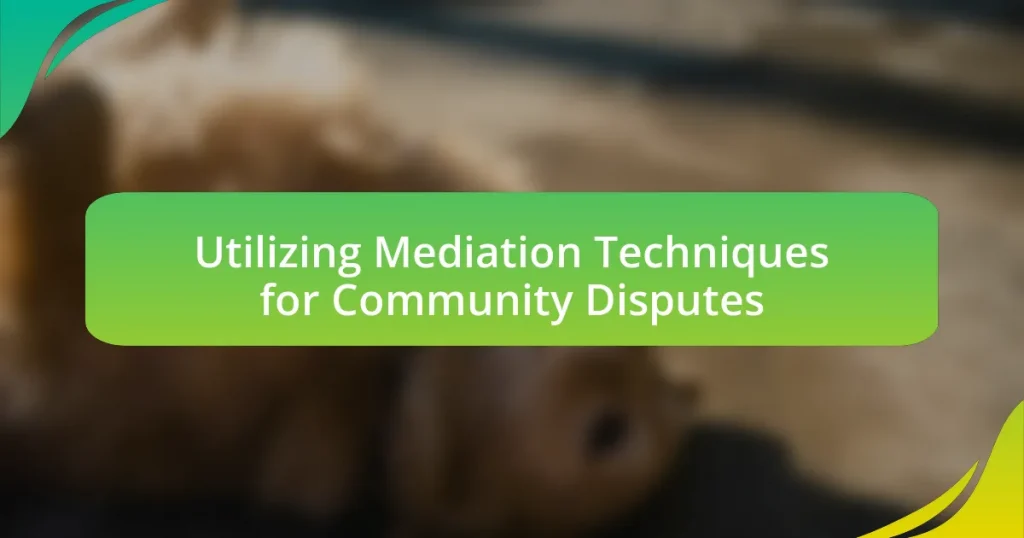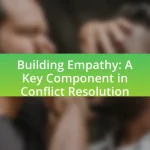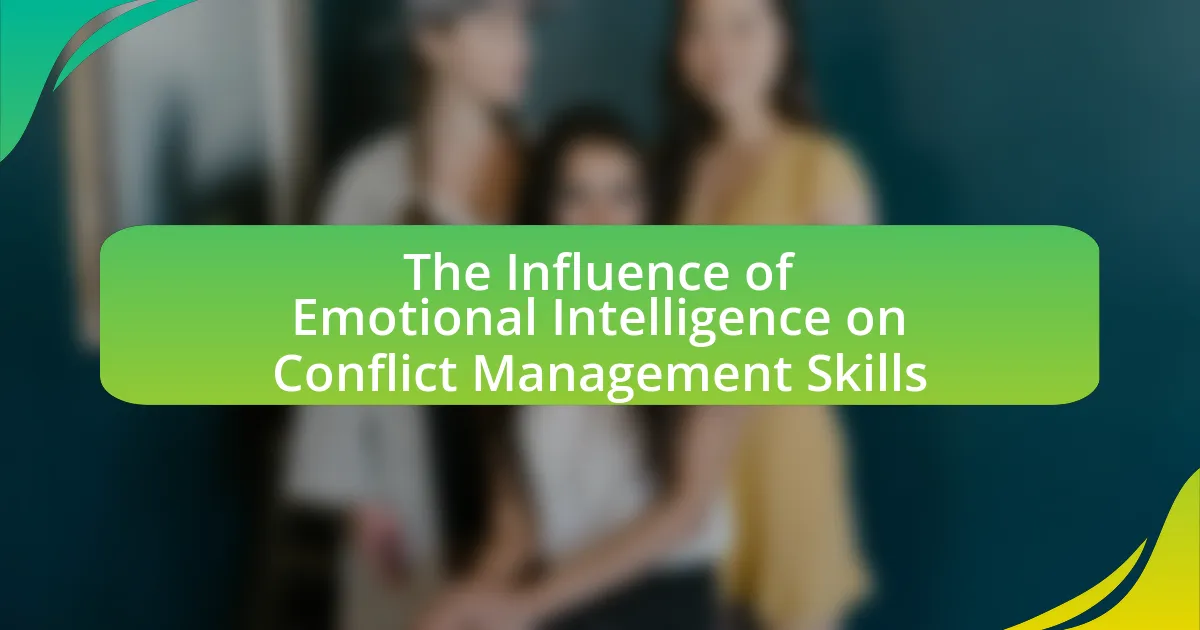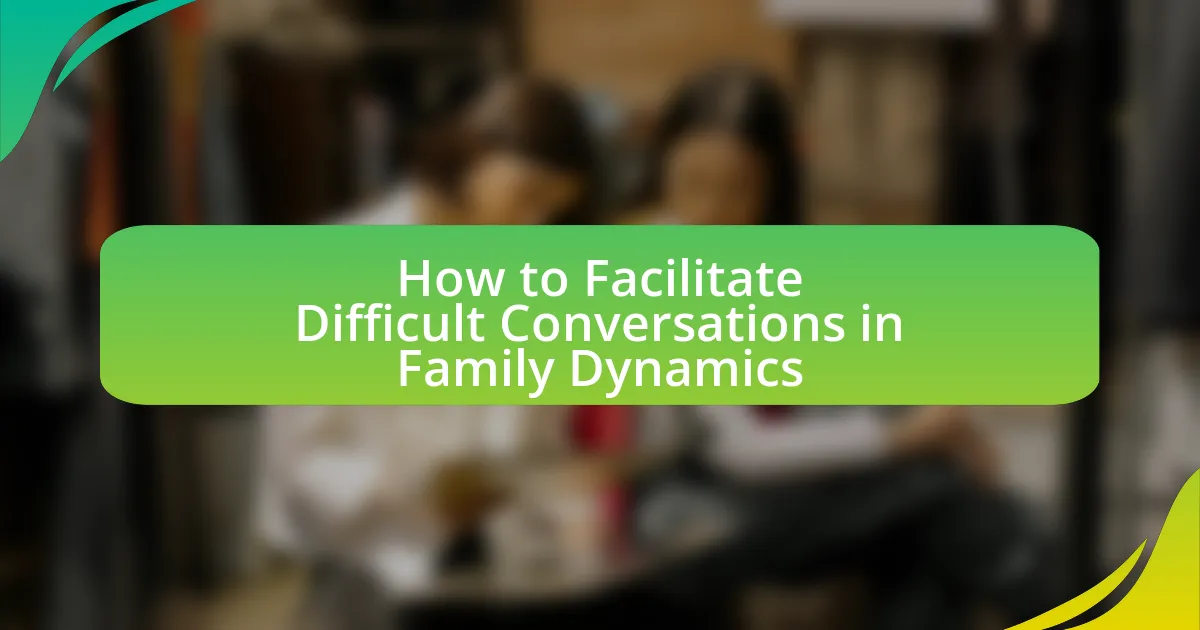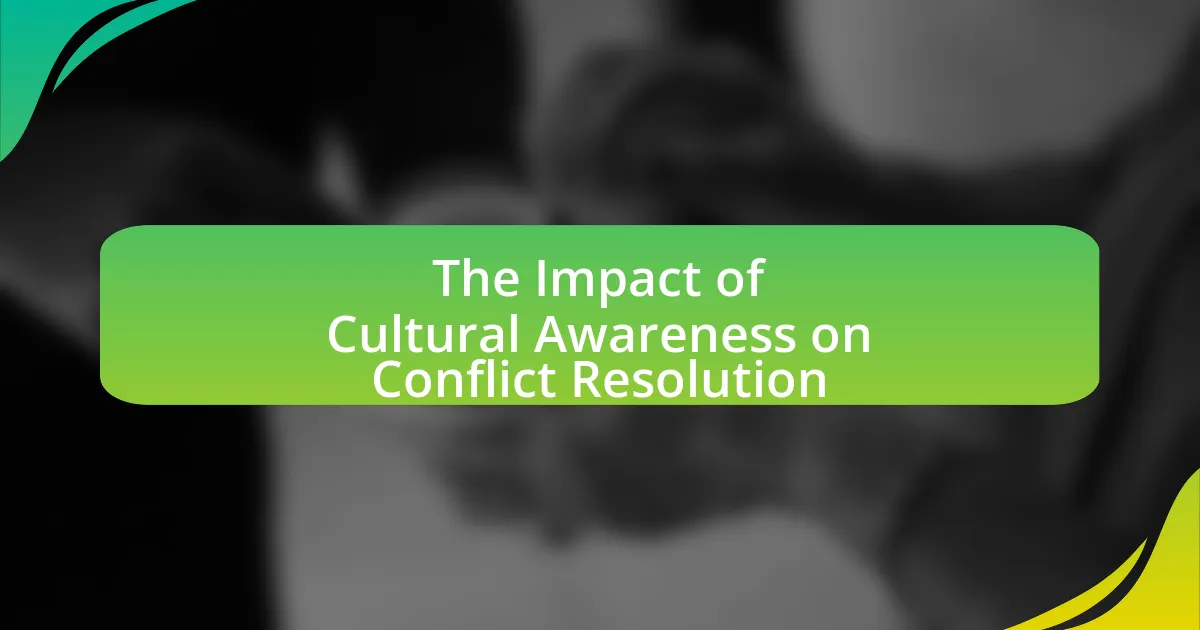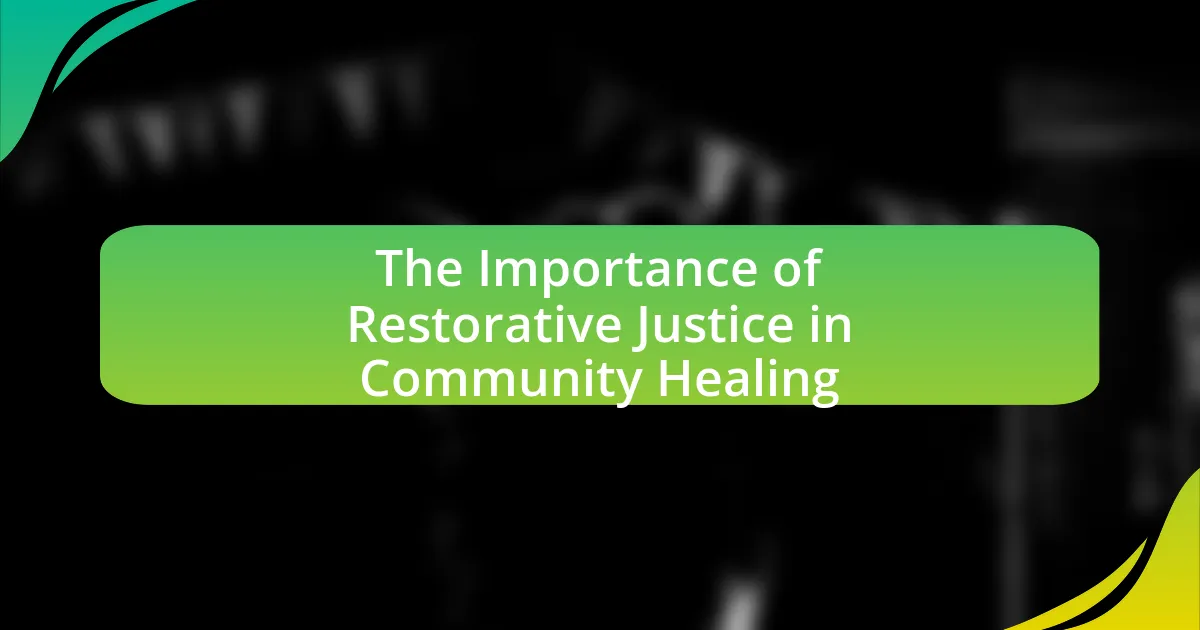The article focuses on utilizing mediation techniques for resolving community disputes, highlighting various methods such as facilitative, evaluative, and transformative mediation. It outlines the differences between mediation and other conflict resolution methods, emphasizing the principles of neutrality, confidentiality, and voluntary participation that underpin effective mediation. The article also discusses the mediation process, its importance for community cohesion, potential outcomes, and the challenges faced, including power imbalances and cultural differences. Additionally, it provides best practices for mediators and resources available for communities seeking mediation support, underscoring the role of local organizations in facilitating these efforts.
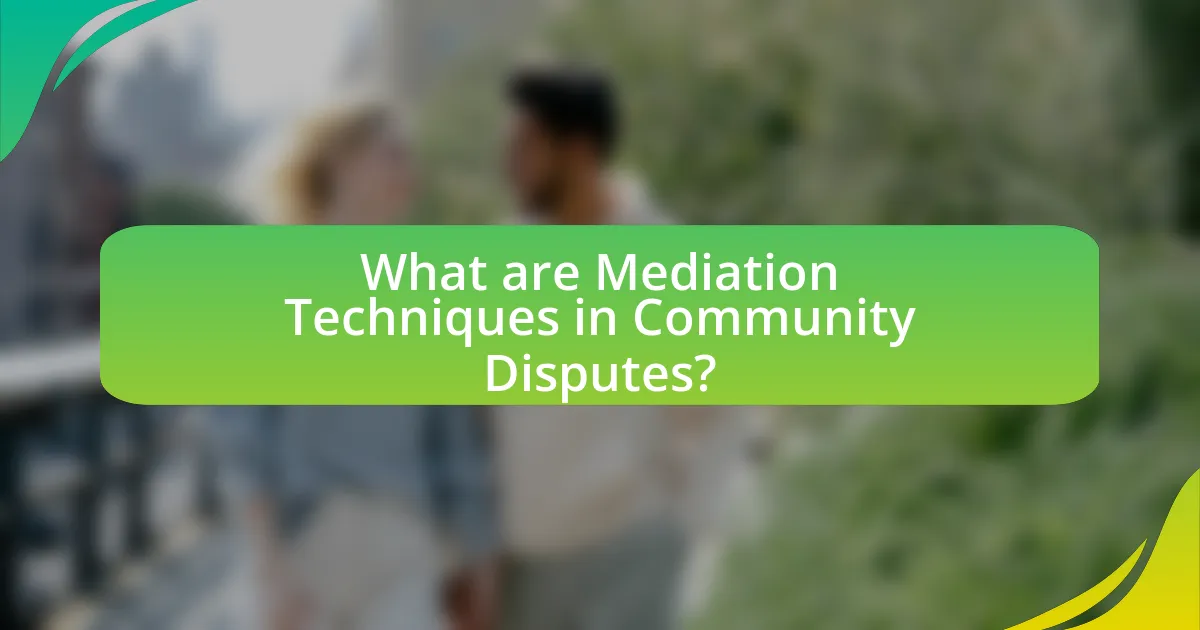
What are Mediation Techniques in Community Disputes?
Mediation techniques in community disputes include facilitative mediation, evaluative mediation, and transformative mediation. Facilitative mediation focuses on helping parties communicate effectively and understand each other’s perspectives, often leading to mutually agreeable solutions. Evaluative mediation involves the mediator providing opinions on the merits of the case, guiding parties toward a resolution based on legal standards or precedents. Transformative mediation aims to empower parties and improve their relationship, fostering understanding and collaboration. These techniques are supported by research indicating that structured mediation processes can significantly reduce conflict and enhance community cohesion.
How do mediation techniques differ from other conflict resolution methods?
Mediation techniques differ from other conflict resolution methods primarily in their focus on facilitating dialogue and collaboration between conflicting parties rather than imposing solutions. In mediation, a neutral third party assists the disputants in communicating their needs and interests, allowing them to reach a mutually acceptable agreement. This contrasts with methods like arbitration, where an arbitrator makes a binding decision, or litigation, which involves a court ruling. Research indicates that mediation often leads to higher satisfaction rates among participants, as it empowers them to take ownership of the resolution process, fostering better long-term relationships and compliance with the agreed-upon solutions.
What are the key principles of mediation in community settings?
The key principles of mediation in community settings include neutrality, confidentiality, voluntary participation, and empowerment. Neutrality ensures that the mediator remains impartial, facilitating a balanced dialogue between conflicting parties. Confidentiality protects the privacy of the discussions, encouraging open communication without fear of repercussions. Voluntary participation allows parties to engage in the mediation process willingly, fostering a sense of ownership over the resolution. Empowerment enables individuals to express their needs and interests, promoting collaborative problem-solving. These principles are essential for effective mediation, as they create a safe and constructive environment for resolving disputes within communities.
How does the mediation process unfold in community disputes?
The mediation process in community disputes typically unfolds in several structured stages. Initially, a neutral mediator is selected to facilitate the discussion between the conflicting parties. This mediator establishes ground rules and ensures a safe environment for dialogue. Following this, each party presents their perspective on the dispute, allowing for an understanding of the underlying issues.
Next, the mediator encourages open communication, helping the parties to identify common interests and explore potential solutions collaboratively. This phase often involves brainstorming and negotiating options that satisfy both parties’ needs. Finally, the mediator assists in drafting a written agreement that outlines the terms of the resolution, ensuring that both parties are committed to the outcome.
Research indicates that mediation can lead to higher satisfaction rates among participants compared to traditional conflict resolution methods, as it empowers individuals to take an active role in resolving their disputes.
Why is mediation important for community disputes?
Mediation is important for community disputes because it facilitates constructive dialogue and resolution between conflicting parties. This process allows individuals to express their concerns and interests in a controlled environment, promoting understanding and collaboration. Research indicates that mediation can lead to higher satisfaction rates among participants compared to traditional litigation, as it empowers them to actively participate in the resolution process. According to a study published in the Journal of Conflict Resolution, mediation resolves disputes in approximately 70-80% of cases, demonstrating its effectiveness in fostering peaceful outcomes within communities.
What are the potential outcomes of successful mediation?
Successful mediation can lead to several positive outcomes, including resolution of disputes, improved relationships, and enhanced communication among parties. When disputes are resolved through mediation, parties often reach mutually acceptable agreements that address their needs and concerns, reducing the likelihood of future conflicts. Additionally, successful mediation fosters better relationships by encouraging collaboration and understanding, which can be particularly beneficial in community disputes where ongoing interactions are common. Enhanced communication skills developed during mediation can also contribute to more effective dialogue in the future, promoting a culture of cooperation. These outcomes are supported by studies indicating that mediation not only resolves conflicts but also improves interpersonal dynamics and community cohesion.
How does mediation contribute to community cohesion?
Mediation contributes to community cohesion by facilitating open communication and understanding among diverse groups. This process allows individuals to express their concerns and perspectives in a structured environment, promoting empathy and reducing misunderstandings. Research indicates that communities engaged in mediation experience lower conflict levels and improved relationships, as evidenced by a study conducted by the National Institute for Dispute Resolution, which found that mediation programs led to a 30% decrease in neighborhood disputes. By fostering collaboration and mutual respect, mediation strengthens social ties and enhances the overall sense of belonging within the community.
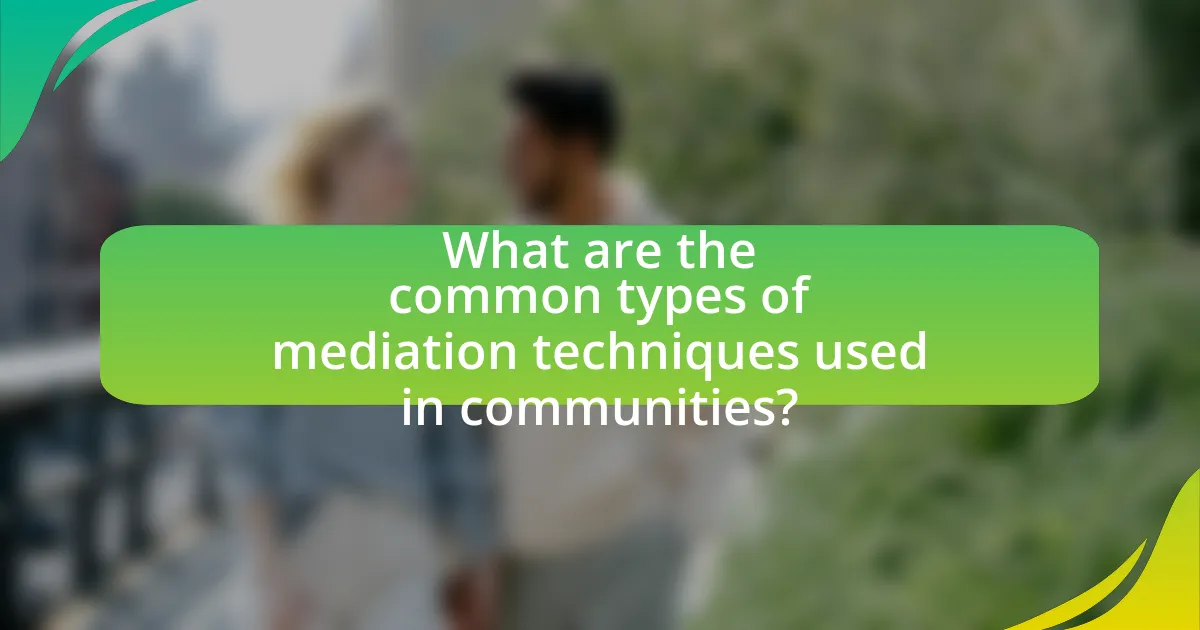
What are the common types of mediation techniques used in communities?
Common types of mediation techniques used in communities include facilitative mediation, evaluative mediation, and transformative mediation. Facilitative mediation focuses on helping parties communicate and understand each other’s perspectives, often leading to collaborative solutions. Evaluative mediation involves the mediator providing opinions on the merits of the case, guiding parties toward a resolution based on legal standards or norms. Transformative mediation aims to empower individuals and improve their relationships, fostering personal growth and mutual understanding. These techniques are widely recognized for their effectiveness in resolving disputes and enhancing community cohesion.
How does facilitative mediation work in community disputes?
Facilitative mediation in community disputes involves a neutral mediator guiding the parties to communicate effectively and explore their interests, ultimately helping them reach a mutually acceptable resolution. The mediator does not impose solutions but facilitates dialogue, allowing each party to express their concerns and perspectives. This process encourages collaboration and understanding, which is essential in community settings where relationships and ongoing interactions are significant. Research indicates that facilitative mediation can lead to higher satisfaction rates among participants, as it empowers them to take ownership of the resolution process and fosters a sense of community.
What skills are essential for a facilitative mediator?
Essential skills for a facilitative mediator include active listening, neutrality, effective communication, empathy, and problem-solving abilities. Active listening allows mediators to fully understand the perspectives of all parties involved, ensuring that each voice is heard. Neutrality is crucial as it helps maintain an unbiased environment, fostering trust among participants. Effective communication skills enable mediators to articulate ideas clearly and facilitate dialogue. Empathy allows mediators to connect with the emotions of the parties, promoting a collaborative atmosphere. Lastly, strong problem-solving abilities help mediators guide discussions toward mutually acceptable solutions, enhancing the overall mediation process.
What are the advantages of facilitative mediation in community settings?
Facilitative mediation in community settings offers several advantages, including enhanced communication, empowerment of participants, and resolution of conflicts in a collaborative manner. Enhanced communication occurs as mediators guide discussions, allowing parties to express their needs and concerns openly, which can lead to a better understanding of differing perspectives. Empowerment is achieved as participants take an active role in crafting their own solutions, fostering a sense of ownership over the outcome. Additionally, facilitative mediation promotes collaborative resolution, which can strengthen community ties and encourage ongoing relationships among participants. Studies indicate that community mediation programs often result in higher satisfaction rates among participants compared to traditional dispute resolution methods, highlighting the effectiveness of this approach in fostering positive outcomes.
What role does transformative mediation play in community disputes?
Transformative mediation plays a crucial role in community disputes by focusing on empowering the parties involved and fostering mutual recognition. This approach encourages individuals to understand each other’s perspectives, which can lead to more meaningful resolutions and improved relationships. Research indicates that transformative mediation can significantly reduce conflict recurrence, as it addresses the underlying issues rather than just the surface-level disputes. For instance, a study published in the “Journal of Conflict Resolution” found that transformative mediation led to a 70% satisfaction rate among participants in community disputes, highlighting its effectiveness in promoting long-term harmony.
How does transformative mediation differ from facilitative mediation?
Transformative mediation focuses on empowering the parties involved and fostering mutual recognition, while facilitative mediation emphasizes guiding the parties to reach a mutually acceptable agreement. In transformative mediation, the mediator facilitates a process that encourages individuals to understand each other’s perspectives and transform their relationship, which is supported by the work of Bush and Folger in their book “The Promise of Mediation.” In contrast, facilitative mediation, as described by Moore in “The Mediation Process,” involves the mediator helping the parties identify their interests and options to negotiate a resolution, without necessarily focusing on changing their relationship dynamics.
What are the benefits of transformative mediation for community relationships?
Transformative mediation enhances community relationships by fostering understanding and empowering individuals to resolve conflicts collaboratively. This approach focuses on transforming the interpersonal dynamics between parties, encouraging them to communicate openly and recognize each other’s perspectives. Research indicates that transformative mediation leads to improved relationships, as it promotes empathy and mutual respect, which are essential for community cohesion. A study by Bush and Folger in “The Promise of Mediation” highlights that transformative mediation not only resolves disputes but also strengthens community ties by enabling participants to develop skills for future interactions.
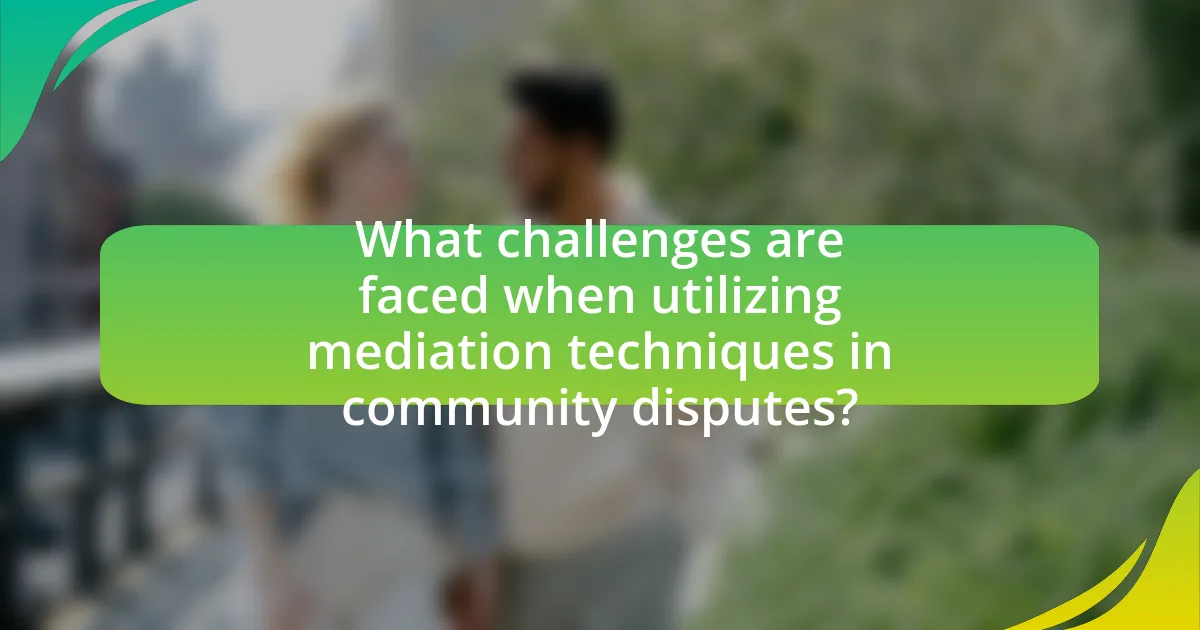
What challenges are faced when utilizing mediation techniques in community disputes?
Mediation techniques in community disputes face several challenges, including power imbalances, lack of trust among parties, and cultural differences. Power imbalances can hinder effective communication, as one party may dominate the discussion, leading to an unfair resolution. Lack of trust can prevent parties from being open and honest during mediation, which is essential for reaching a mutually agreeable solution. Cultural differences may also complicate the mediation process, as varying communication styles and conflict resolution approaches can lead to misunderstandings. These challenges can significantly impact the effectiveness of mediation in resolving community disputes.
What are the common barriers to effective mediation in communities?
Common barriers to effective mediation in communities include lack of trust among parties, inadequate communication skills, and cultural differences. Lack of trust can hinder open dialogue, making it difficult for parties to express their concerns and work towards resolution. Inadequate communication skills can lead to misunderstandings and escalation of conflicts, as parties may struggle to articulate their needs or listen to others. Cultural differences can create additional challenges, as varying backgrounds may influence perceptions, values, and conflict resolution styles, complicating the mediation process. These barriers can significantly impede the effectiveness of mediation efforts in resolving community disputes.
How can cultural differences impact the mediation process?
Cultural differences can significantly impact the mediation process by influencing communication styles, conflict resolution approaches, and perceptions of authority. For instance, individuals from collectivist cultures may prioritize group harmony and consensus, while those from individualistic cultures may focus on personal rights and direct expression of grievances. This divergence can lead to misunderstandings or misinterpretations during mediation sessions. Research indicates that cultural awareness among mediators enhances the effectiveness of the process, as it allows for tailored strategies that respect the values and norms of the parties involved. A study by Boulle and Alexander (2008) highlights that mediators who are culturally competent can facilitate better dialogue and understanding, ultimately leading to more satisfactory outcomes for all parties.
What strategies can be employed to overcome these barriers?
To overcome barriers in utilizing mediation techniques for community disputes, implementing structured communication strategies is essential. These strategies include establishing clear guidelines for dialogue, ensuring all parties feel heard, and fostering an environment of mutual respect. Research indicates that structured communication can significantly reduce misunderstandings and promote collaborative problem-solving, as evidenced by a study published in the Journal of Conflict Resolution, which found that communities employing structured mediation techniques reported a 30% increase in successful dispute resolutions. Additionally, training mediators in cultural competency can address barriers related to diverse backgrounds, enhancing the effectiveness of mediation efforts.
How can mediators ensure fairness and neutrality in community disputes?
Mediators can ensure fairness and neutrality in community disputes by adhering to established ethical guidelines and employing structured processes. These guidelines, such as those from the American Arbitration Association, emphasize impartiality, confidentiality, and informed consent, which help maintain a balanced environment. Additionally, mediators can utilize techniques like active listening and reframing to validate each party’s perspective without bias, fostering an atmosphere of respect and understanding. Research indicates that mediators who follow these practices are more likely to achieve equitable outcomes, as they create a safe space for open dialogue and collaboration among disputing parties.
What ethical considerations should mediators keep in mind?
Mediators should prioritize neutrality, confidentiality, and informed consent as key ethical considerations. Neutrality ensures that mediators do not favor any party, maintaining fairness and trust in the process. Confidentiality protects the privacy of the parties involved, encouraging open communication without fear of repercussions. Informed consent requires mediators to ensure that all parties understand the mediation process and agree to participate voluntarily, which is essential for ethical practice. These principles are supported by the Model Standards of Conduct for Mediators, which emphasize the importance of these ethical guidelines in fostering effective and equitable mediation outcomes.
How can mediators build trust with community members?
Mediators can build trust with community members by actively listening to their concerns and demonstrating empathy. Active listening involves giving full attention to speakers, acknowledging their feelings, and validating their experiences, which fosters a sense of respect and understanding. Research indicates that when individuals feel heard, they are more likely to engage positively in the mediation process, as shown in a study by the American Psychological Association, which found that empathetic communication significantly enhances trust in conflict resolution settings. By consistently applying these techniques, mediators can create a safe environment that encourages open dialogue and collaboration among community members.
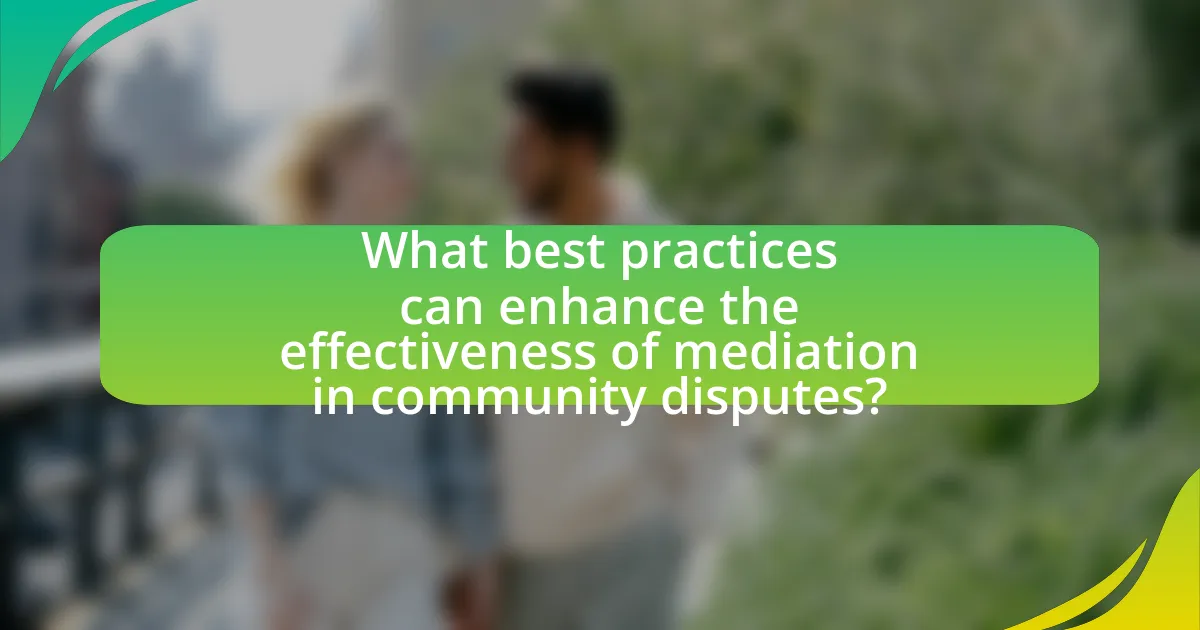
What best practices can enhance the effectiveness of mediation in community disputes?
Best practices that enhance the effectiveness of mediation in community disputes include establishing clear communication, ensuring neutrality, and fostering a collaborative environment. Clear communication allows all parties to express their concerns and needs, which is essential for understanding differing perspectives. Neutrality from the mediator helps build trust, as it assures participants that the mediator is impartial and focused on facilitating a fair resolution. Fostering a collaborative environment encourages participants to work together towards a mutually beneficial outcome, rather than viewing each other as adversaries. Research indicates that these practices significantly improve the likelihood of reaching a satisfactory agreement, as evidenced by studies showing higher success rates in mediations that prioritize these elements.
How can community members prepare for mediation sessions?
Community members can prepare for mediation sessions by gathering relevant information and clarifying their goals. This preparation involves identifying the issues at stake, understanding their own positions, and considering the perspectives of other parties involved. Additionally, practicing active listening and communication skills can enhance their effectiveness during the session. Research indicates that individuals who prepare adequately for mediation are more likely to reach satisfactory resolutions, as they are better equipped to articulate their needs and understand the dynamics of the discussion.
What steps can be taken to create a conducive environment for mediation?
To create a conducive environment for mediation, it is essential to establish a neutral and private setting where all parties feel safe to express their views. This can be achieved by selecting a location that is comfortable and free from distractions, ensuring confidentiality, and providing adequate resources such as seating arrangements and materials for note-taking. Research indicates that a neutral environment reduces anxiety and promotes open communication, which is crucial for effective mediation. Additionally, setting ground rules for respectful dialogue and active listening can further enhance the mediation process, fostering a collaborative atmosphere that encourages resolution.
How can follow-up actions improve mediation outcomes?
Follow-up actions can significantly improve mediation outcomes by ensuring that agreements are implemented and maintained over time. When mediators or involved parties engage in follow-up actions, they reinforce the commitment to the resolution, address any emerging issues, and provide support for the parties in adhering to the agreed terms. Research indicates that follow-up can lead to higher satisfaction rates among participants, as it demonstrates accountability and fosters trust. For instance, a study published in the “Journal of Conflict Resolution” found that mediation outcomes were more successful when follow-up meetings were conducted, resulting in a 30% increase in compliance with agreements. This evidence underscores the importance of follow-up actions in enhancing the effectiveness of mediation in community disputes.
What resources are available for communities seeking mediation support?
Communities seeking mediation support can access various resources, including local mediation centers, online platforms, and community organizations that specialize in conflict resolution. Local mediation centers often provide trained mediators who facilitate discussions between conflicting parties, while online platforms like Mediate.com offer resources and directories for finding mediators. Additionally, organizations such as the Association for Conflict Resolution provide training and certification for mediators, enhancing the skills available within communities. These resources are essential for fostering effective communication and resolving disputes amicably.
How can communities access trained mediators?
Communities can access trained mediators through local mediation centers, community organizations, and online directories that list certified mediators. Many mediation centers offer services specifically tailored for community disputes, often providing free or low-cost mediation options. For instance, the Association for Conflict Resolution maintains a directory of trained mediators, which can be a valuable resource for communities seeking assistance. Additionally, local government agencies may also facilitate access to mediation services by partnering with trained professionals to resolve disputes effectively.
What role do local organizations play in supporting mediation efforts?
Local organizations play a crucial role in supporting mediation efforts by facilitating communication and providing resources for conflict resolution. These organizations often serve as intermediaries, connecting disputing parties and fostering dialogue to reach mutually acceptable solutions. For example, community mediation centers, which are often run by local nonprofits, offer trained mediators who help resolve disputes in neighborhoods, schools, and workplaces, thereby reducing the need for formal legal proceedings. Research indicates that mediation programs led by local organizations can lead to higher satisfaction rates among participants, as they often feel more empowered and involved in the resolution process.
